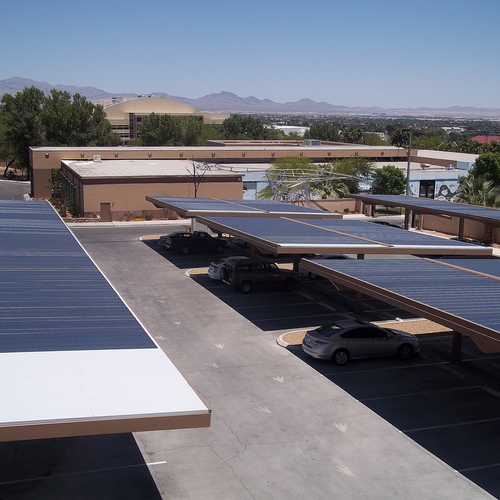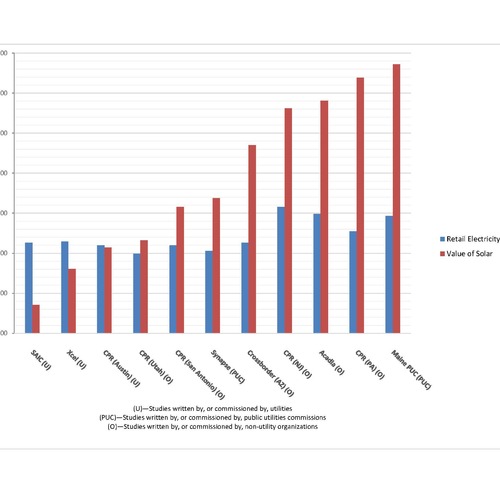
A study conducted for the Maine Public Utilities Commission says that the real value of electricity generated by photovoltaic (PV) panels is more than twice what solar customers currently get under net-metering rules.
The study, Maine Distributed Solar Valuation Study, was the result of legislation passed last year directing the PUC to calculate the value of “distributed solar generation” in the state. The report was turned over to a legislative committee on March 1, 2015.
The authors conclude the long-term value of solar electricity is about 33 cents per kilowatt hour. Under current net-metering arrangements, solar customers now get about 13 cents per kWh when they sell excess power to the grid, the Natural Resources Council of Maine (NRCM) said in a news release.
The study weighed a number of “avoided market costs” that solar electricity would save, plus several social benefits, including the social cost of carbon and air pollutants. In all, the study said the long-term value of solar electricity amounted to 13.8 cents per kWh in avoided market costs and another 19.9 cents per kWh in societal benefits, for a total of 33.7 cents per kWh.
The report has been praised, but also called incomplete
The study’s conclusions were welcomed by the NRCM, solar installer Revision Energy, and the American Lung Association of the Northeast.
“Many other states have reached the same conclusion about the high value of solar and in response, they have implemented strong solar policy initiatives to encourage public and private solar investments,” Revision Energy co-owner Phil Coupe said in a statement released through the NRCM. “We hope this study lays the foundation for Maine to adopt policies similar to those in New Hampshire, Massachusetts, and elsewhere, that rapidly increase access to solar by addressing barriers and doing more to spur the solar market.”
NRCM clean energy director Dylan Voorhees said in the group’s written statement that the study confirmed the “enormous value” of solar energy to the state. But the environmental lobbying group also said that the study undervalued solar energy by not accounting for any reduced costs of the distribution grid, which can be smaller in scale and complexity than the larger utility grid that serves the region.
“Utility data has shown that this benefit is tangible, but the value has been disputed,” the NRCM statement said. “When a value is ultimately included for this, it would increase the benefit of solar further.”
The group also said the study didn’t account for the jobs that solar energy creates because that was beyond the PUC’s ability to analyze. “However,” it said, “other studies have found that every megawatt of solar power installed creates one or two direct jobs.”
One of many similar studies around the country
The study in Maine is one of many that have been undertaken in recent years as the number of residential PV systems rises and utilities begin to worry about the long-term implications of net-metering policies.
Many utilities have complained that residential solar customers are getting what amounts to a subsidy from non-solar customers because net metering reduces the amount of money they contribute to grid maintenance. Some have successfully sought user fees and other charges to help offset those costs.
Solar advocates, on the other hand, argue that solar energy produced by small-scale projects is often under-valued, and that it helps utilities avoid a variety of distribution and generation costs, especially when power is produced at times of peak loads, and ultimately benefits all customers. This report is likely to add weight to that point of view.
In a report published two years ago, the Rocky Mountain Institute examined 16 cost/benefit studies by utilities, national labs, and others that had been conducted between 2005 and 2013, but didn’t find much common ground between them. In fact, RMI said, there is a “significant range of estimated value across studies, driven primarily by differences in local context, input assumptions and methodological approaches.”
“Today, the increasingly rapid adoption of distributed solar photovoltaics (DPV) in particular is driving a heated debate about whether DPV creates benefits or imposes costs to stakeholders within the electricity system,” the RMI report said. “But the wide variation in analysis approaches and quantitative tools used by different parties in different jurisdictions is inconsistent, confusing and frequently lacks transparency.”
Practical effects in Maine are not clear
It wasn’t clear what practical effects the Maine findings would have in the near term.
Solar customers of Central Maine Power, the state’s largest electric utility, are already getting the retail rate for excess electricity, so an adjustment of the net-metering rate doesn’t seem likely. But the report could provide a tailwind for legislation aimed at expanding solar energy in the state, and ultimately lead to more compensation to owners of renewable energy systems, Voorhees said by telephone.
Voorhees said he found the report’s conclusion on the long-term value of solar energy “a little bit surprising” and on the high side of value studies elsewhere. But, he added, “it provides pretty strong evidence that a lot of value is being left on the table.”
Central Maine Power didn’t respond to a request for comment.
Weekly Newsletter
Get building science and energy efficiency advice, plus special offers, in your inbox.















3 Comments
net metering in Maine
Here in Maine, if you produce more than you use over a 12 month period, you don't get paid for the excess. The utility keeps it. Thus, there is a disincentive to add more PV than you expect to use.
The legislature has been pretty pro-solar, but the governor is not, so it's been hard to create any incentives, because there aren't enough votes to override a veto. Last fall's election resulted in more republicans in the legislature, so I'm not optimistic that we'll see any new legislation, even though Maine's GOP is considerably less antagonistic toward solar than in some states.
The GOP is getting less antagonistic in most states.
The conservative Evangelicals and the libertarian Tea Party members are all largely in favor of privately owned distributed generation hooked up to the grid and being compensated fairly for it's value. The folks that are antagonistic are the climate-denier tribes and the paranoid that think solar power all some sort of liberal plot hatched by some hippies or something, some of the same folks who stocked up on incandescent light bulbs before those efficiency standards denied them the right to choose how to light their houses. It seems more tribal/cultural more than rational, but it's being played up by some with financial interests in the status quo.
There's no reason why PV and net metering issues should fall along some partisan divide. The whole notion of monopoly utility companies is somewhat anathema to a capitalist culture & economy, but was one way to develop the grid rapidly when there were significant economies of scale to be had. When the monopoly utility model was developed there were significant economies of scale. The capital & operating costs of a privately owned gas turbine, thermal coal plant or nuke is many orders of magnitude more expensive for individuals or small groups can handle. But with PV the difference in $/watt between a 5kw grid tied array and a 50mega-watt array is fairly small (and shrinking), less that 2x. There is no rational reason for large monopolies to own and control all of the distributed PV assets- it would only add adminstrative overhead costs. The whole business model and rationale is dissolving, and will be pretty much obsolete in a generation. The grid may still be necessary, but vertically integrated monopoly companies that own everything from the meter to the power generation and back makes less sense with every passing day.
It is not all climate change deniers
ALEC, the American Legislative Exchange Council, funded largely by the K. Brothers and other fossil fuel companies, has recently been given cash from Utility Company trade groups to pass laws, or at least allow regulators to set fees for distributed solar. Dana is right that some GOP states have not followed ALEC's bidding, Indiana was probably going to pass it, but a huge public uproar caused the GOP leaders to pull the bill just before a vote was to be taken on it. But some states have already passed laws or regulations to institute fees on residential solar. Walmart is even getting in on the ALEC action, as they want to make it hard for residential solar, even as they have started moving into the commercial solar market. http://cleantechnica.com/2014/10/15/walmart-owners-investing-millions-anti-solar-activities/
Log in or create an account to post a comment.
Sign up Log in